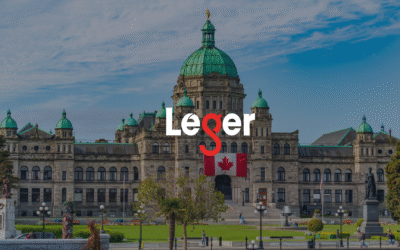During the election campaign, we conduct a weekly survey of Canadians to track their voting intentions and gather their views on key federal political issues.
Highlights include…
-
Mark Carney’s Liberal Party continues to lead in voting intentions. Currently, 43% of Canadians say they would vote for the Liberal Party if the election were held today, compared to 38% for Pierre Poilievre’s Conservative Party. The gap between the Liberals and the Conservatives narrows from 7 points to 5 points this week.
-
Nearly seven Canadians out of ten (68%) say their vote is final at this point of the campaign, while less than a third (31%) remain open to changing their mind. Conservative voters (76%) are more likely to say that their choice is final.
-
Nearly half of Canadians (47%) say they would prefer a Liberal win in the upcoming election, with 32% favouring a Liberal majority government and 14% a Liberal minority. In comparison, over a third (36%) would prefer a Conservative win, including 30% who would like to see a Conservative majority and 6% a Conservative minority government.
-
Donald Trump and his tariffs influence the vote of more than half of Canadians (58%) when it comes to choosing a party or party leader, including 21% who say they are influenced a lot, 23% somewhat, and 14% very little.
-
Hope for a better future in Canada to live, work, and raise a family is the main emotion driving voter choice for over half of Canadians (51%), ahead of fear about what the future may hold for the country in light of U.S. trade actions (39%). Conservative voters (76%) are more likely to be motivated by hope, while Liberal voters (60%) are more likely to be influenced by fear.
-
More than half of Canadians (52%) say they will either definitely (22%) or probably (30%) watch the leaders’ debate in French or English. In addition, 27% say they will not watch the debate live but will view clips online or in the news. Only 17% say the debate could make them change their mind and vote for another party.
-
Mark Carney is predicted to win the English-language debate by 39% of Canadians, compared to 27% who believe it will be Pierre Poilievre. However, Canadians believe Pierre Poilievre will win the French-language debate, with only 11% saying the winner will be Carney.
-
Mark Carney is viewed as the leader best suited to manage Canada’s relationship with the U.S. and Donald Trump (46% vs. 28% for Poilievre), to navigate the economy through today’s uncertainty (44% vs. 31%), to handle the cost-of-living crisis (38% vs. 33%), and to strengthen national unity (36% vs. 29%). In contrast, Pierre Poilievre is seen as the leader who best understands Canadians (33% vs. 27% for Carney), who has what it takes to fix the immigration system (35% vs. 26%), and who is most capable of lowering taxes (39% vs. 25%).
-
Carney’s experience at the Bank of Canada and the Bank of England (45%), along with the fact that he seems calm and stable (42%), are the main reasons why Canadians see him as the best leader to manage the relationship with the U.S. and President Donald Trump.
-
Support for sovereignty is low in provinces outside of Quebec. One in five Canadians (20%) would support their province becoming a separate country. Residents of Alberta are more likely to hold this view, with 29% in favour. By comparison, 40% of Quebecers would like their province to become a country.
Methodology
The results for this wave of research are based on online research conducted from April 11 to April 14, 2025 with a representative sample of 3,005 Canadian adults 18 years of age and older from Leger’s LEO panel.
The data was statistically weighted according to 2021 Canadian Census figures.
A margin of error cannot be associated with a non-probability sample in a panel survey, but for comparison purposes, a probability sample of 3,005 would have a margin of error of +/- 1.79%, 19 times out of 20.




